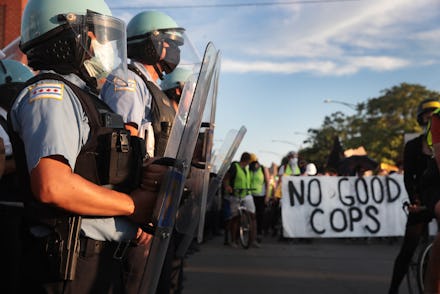Chicago's response to weekend looting was disappointingly predictable

On Sunday evening, hundreds of Chicago police officers descended into the city's downtown area after receiving a tip that some Chicago residents would be breaking into stores along Miracle Mile, the region's high-end shopping street. According to the Chicago Tribune, 400 officers made more than 100 arrests late Sunday night and into early Monday morning. Both the police chief and Chicago Mayor Lori Lightfoot (D) were adamant that the people who took to the streets perpetuated "pure criminality" and demonstrated "abject criminal behavior." Black Lives Matter organizers argue instead that Chicago residents acted out of anger and hurt over a Sunday afternoon police shooting of a young Black man.
The Chicago Police Department said that they had responded earlier Sunday to a tip of a young man with a gun in a neighborhood on Chicago's South Side. According to a press release from CPD, officers arrived on the scene and saw a man who matched a description they'd been given; they then confronted the man, later identified as 20-year-old Latrell Allen. The press release states that Allen ran from police and, while fleeing, turned to shoot at the officers, which is when police shot at him in response. It also states that "the offender's firearm was recovered at the scene."
But the facts of Allen's interaction with authorities are in dispute. Allen's mom told the local CBS station that police shot her son five times, but she claims that Allen did not have a gun Sunday afternoon and was merely trying to run away from police after they arrived at the park he was at.
Any documentation of the police shooting of Allen will have to come from potential cameras in the surrounding area, as none of the officers involved were wearing body cameras. The department is charging Allen with two counts of attempted murder and unlawful possession of a weapon, according to The New York Times.
One city police official said the Sunday evening uprising could be due to "misinformation" about what really happened in the alley between Allen and CPD officers. Some social media posts incorrectly stated Allen's age, describing him as a young teenager, or claimed that police had shot and killed him. Black Lives Matter Chicago and those who took to the streets Sunday night disputed the Chicago Police Department's story and argue that the history of police misconduct and abuse in the city justifies the outpouring of anger in response to the shooting incident with Allen.
The CPD does have a long history of abusing those in their custody and deploying disproportionately violent force against people of color. As Rob Arthur wrote for The Intercept in 2018: "Recently released data from the Chicago police department shows that misconduct spreads from officer to officer like an infectious disease." Black Chicagoans comprise 72% of the victims of police force, compared with just 10% of white people, despite accounting for the same percent of the city's population.
After police made their mass arrests, city prosecutor Kim Foxx vowed to bring charges against dozens of individuals, saying, "Last night was a blatant display of criminal behavior." By the morning, city officials had raised the bridges downtown as a way to "seal off" the region from further looters, the Chicago Tribune wrote. "The sound of the bridges’ bells tolled throughout an otherwise quiet downtown," the Tribune reported.
While the facts of the incident are in dispute, one thing is clear: Time and time again, officials seem far more comfortable calling citizens in the streets responding to police shootings "violent" than they do holding police to account for the violence they perpetrated. Leaders painted Sunday evening and Monday morning's events as a contrast between the law (CPD) and the lawless ("looters"). It's an unoriginal narrative. As Vicky Osterweil wrote in her 2015 essay "In Defense of Looting": "Only if you believe that having nice things for free is amoral, if you believe, in short, that the current (white-supremacist, settler-colonialist) regime of property is just, can you believe that looting is amoral in itself."